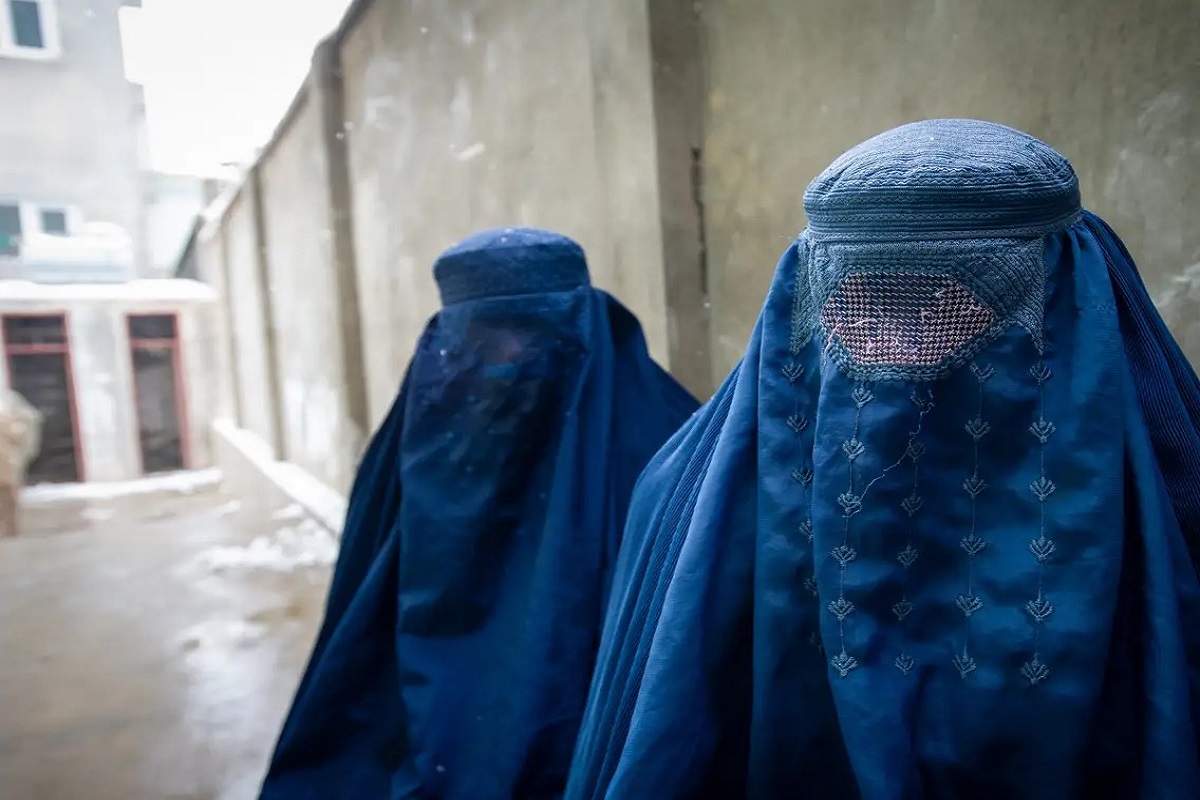Taliban fire rounds to put an end to an Afghan women’s demonstration in Kabul
During the Islamist group's occupation of Afghanistan, hundreds of women were demanding...

Women, Taliban and their false promises
A year ago, an airstrip was the scene of a terrified wave of people trying to flee, but now it is much quieter and cleaner. Billboards featuring the old renowned faces have been covered in paint, and rows of white Taliban flags wave in the June breeze.
The women stamping passports at Kabul International Airport are the first thing you see when you arrive. They are dressed in brown scarves and black cloaks.
What lies beyond this entryway into a nation that was abruptly overrun by the Taliban?
The messages are shocking, to put it mildly.
One lady posts on a messaging app, “They want me to give my job to my brother,
“We earned our positions with our experience and education… if we accept this it means we have betrayed ourselves,” declares another.
Several former top government workers from the finance ministry are speaking to me as we are seated at a table.
They are a part of a group of over 60 women, many of whom work for the Afghanistan Revenue Directorate, who formed a group after being told to return home in August of last year.
They claim that after that, Taliban officials instructed them to Send CVs of their male relatives who can apply for their female relatives jobs.
One woman, who cautiously requests that her identity be kept anonymous like all the other ladies in this group, asserts, “This is my job.” “I worked with so much difficulty for more than 17 years to get this job and finish my master’s degree. Now we are back to zero.”
Amina Ahmady, a former director general of the Directorate, joins us on a phone conversation from outside Afghanistan.
She’s escaped, but that’s also not a way out.
She laments, “We are losing our identity. . “The only place we can keep it is in our own country.”
The great title of their organization, “Women Leaders of Afghanistan,” gives them courage; but, what they really want are their jobs.
They are the women who embraced new possibilities for employment and education during the 20 years of foreign engagement that preceded the Taliban regime.
According to Taliban leaders, women are still employed. Those who do tend to work in fields where women are more prevalent, such as medicine, education, and security, notably at airports.
Additionally, the Taliban emphasize that women, who formerly held around 25% of government positions, are still paid, albeit at a much lower rate.
Despite being completely covered, a Talib guard stopped a former civil servant on the street and criticized her Islamic head covering, or hijab.
She said, “You’ve got more important problems to solve than hijab,” demonstrating once again how determined Muslim women are to fight for their rights.
She said, “You’ve got more important problems to solve than hijab,” demonstrating once again how determined Muslim women are to fight for their rights.
Sohaila, who is eighteen, is giddy with joy.
I follow her down a dimly lit stairwell into the women’s-only market’s basement level in Herat, a historic western city renowned for its more liberal culture, science, and creativity.
This bazaar opened for the first time today after being closed by the Taliban and Covid-19 the previous two years.
We look inside her family’s unfinished dress shop through the glass frontage. Red heart balloons hang from the ceiling, while a row of sewing machines is positioned in the corner.
Sohaila gives me a brief overview of the history of the brilliantly colored traditional Kuchi costumes that her mother and grandmother sewed, saying that “Ten years ago, my sister started this shop when she was 18 years old,”
Her sister had also started a restaurant and an online club.
This room is only for ladies, therefore there is a low hum of activity. While some are restocking their shelves, others are chit-chatting while they examine jewelry and embroidered clothing.
There is a shaft of light for women who have spent much too much time sitting at home despite the dim lighting in the building.
Sohaila is going to tell you another tale.
Sohaila is going to tell you another tale
She states matter-of-factly, “The Taliban have closed the high schools,” which has significant ramifications for young, aspirational teenagers like her.
On the directives of the Taliban’s leading ultra-conservative clerics, the majority of secondary schools are closed, despite calls from many Afghans, including Taliban members, for them to reopen.
“I’m in grade 12 – if I don’t graduate I can’t go to university.”
I inquire as to whether she may live out her dream of being Sohaila in Afghanistan. Of course,” she responds with assurance. “It’s my country and I don’t want to go to another country.”
But it must have been challenging to miss a school year. She says stoically, “It’s not just me, it’s all the girls of Afghanistan.”
“It’s a sad memory…”
She begins to sob and her speech falters.
“I was the top student.”
Catch all the Business News, Breaking News Event and Latest News Updates on The BOL News
Download The BOL News App to get the Daily News Update & Live News.